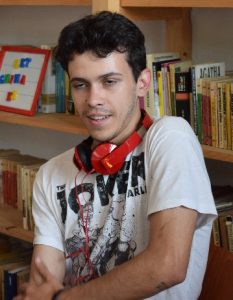Nu vorbesc româneşte – I do not speak Romanian

The feeling when people speak Romanian to you – Sentimentul când oamenii îți vorbesc în română
So you are so excited. You arrived in Romania and you are starting your EVS, you spend your time in Curba or with the other volunteers, English may look complicated but you can communicate with them, suddenly you realize you’re thirsty, but you’re lucky, you have a shop just in front of the organization house, you cross the street, enter the shop and… Oh snap, you have no idea of Romanian. Don’t worry, here you have a small guide made by my experience.
Ești super entuziasmat. Ai ajuns în România ți-ai început EVS-ul, petreci timp la Curbă ori cu alți voluntari, limba engleză pare complicată dar puteți comunica și dintr-o dată realizezi că ți-e sete, dar ai noroc, este un magazin chiar peste drum de organizație, traversezi, intri și… oh, nu ai nici cea mai vagă idee despre limba română. Nu te îngrijora ai aici un mic ghid creat din experiența mea proprie.
So, first of all, read the title, that’s now your god. ”Nu vorbesc româneşte” means ”I don’t speak romanian”. Romanian people will understand it, also they will talk with you anyway, maybe closer to you, louder or slower but you still don’t understand them, so next step: Da (which means yes) repeat it, constantly, you don’t understand what they are telling you so you just keep saying da and laugh whenever they laugh, that’s the best trick.
În primul rând, citește titlul, acesta este noul tău dumnezeu. “I do not speak Romanian” înseamnă “Nu vorbesc românește”. Românii vor înțelge, dar vor vorbi mai departe, poate mai aproape de tine, mai tare sau mai rar, și în continuare nu îi vei înețelege, deci trecem la următorul pas: Da, repetă da, constant, nu înțelegi ce îți spun ei așacă spune mai departe da, și râde ori de câte ori ei râd, cel mai bun truc.
If you’re lucky enough and your native language comes from latin also you will have some word that you can understand randomly, when you understand a word, repeat it and say yes with your head, fantastic, you’re having a perfect conversation now.
Dacă ești suficient de norocos și limba ta maternă vine din latină, vei înțelege niște cuvinte pe ici pe colo, când înțelegi un cuvânt, repetă-l și aprobă cu o mișcare a capului, fantastic, ai o conversație minunată acum.
But now back to the begining, you are in the shop, choose wisely, the common brands has the same language in every country, if you are looking for something different you just need to read the name on it, wait till the cashier stop laughing because you probably said something completely unrelated to what you want and then point at whatever you want. Now is the moment to pay, oh yes, plastic money, you forgot it, it’s always nice to use it the first days, you give the products to the cashier and she says to you ”sapteleişicincizecibani” (or something like that) you enter in full panic mode.
Să ne întoarcem, ești la magazin, alegi cu atenție, mărcile faimoase sunt la fel în fiecare țară, dacă cauți ceva diferit, doar citește ce scrie pe ambalaj, așteaptă până vânzătorul se oprește din râs căci probabil ai spus ceva fără legătură și apoi arată cu degetul spre ceea ce îți dorești. Acum e momentul să plătești, oh da, bani de plastic, am uitat, sunt interesanți în primele zile, dai produsele vânzătorului și îți spune ”sapteleişicincizecibani” (sau ceva asemănător) și începi să te panichezi la maximum.
Now you have two options, first, take a random note and give it to the cashier, if their hands still extended don’t worry put more random notes on it till it’s okay.

When the cashier says the price in Romanian – Când vânzătorul îți spune prețul în română
The second option is to try your Romanian again ”scrieți prețul, vă rog” (Write the price please) they will show you the calculator and the job is done.
Acum ai două variante, prima: iei o bancnotă la întâmplare o dai vânzătorului, iar dacă mâna e încă întinsă, nu te îngrijora, mai pune bancnote la întâmplare până e ok.
A doua variantă este să îți încerci abilitățile de limbă română din nou ”scrieți prețul, vă rog”, ei îți vor arăta ecranul calculatorului și treaba e gata.
So this is a small guide to help your romanian conversations. The last advice I can give you is to learn the language and that the regular water is ”Apă plată” if you don’t want the sparkly one.
See you in the store.
Ăsta e micul meu ghid care să te ajute cu conversațiile în limba română. Un ultim sfat pe care ți-l pot da este să înveți limba și apa normală este denumită ”Apă plată” dacă nu o vrei pe cea cu bule.
Ne vedem la magazin.
Gabriel este în România pentru o perioadă de 12 luni, din iuliie 2017 până în iunie 2018, în cadrul proiectului Izvoarele Unveiled [2016-3-RO01-KA105-035584] proiect co-finanțat de Uniunea Europeană prin Programul Erasmus+ și implementat în România de către Curba de Cultură.
About the author